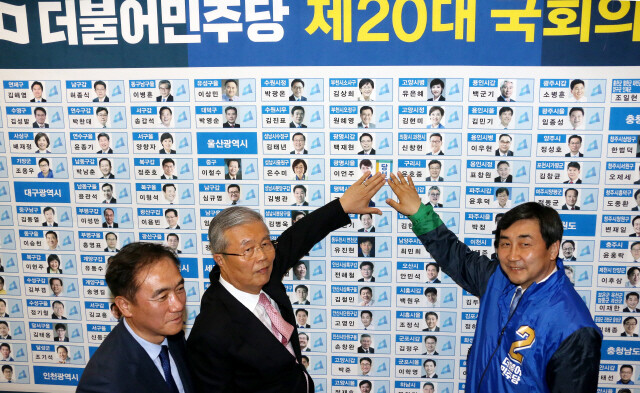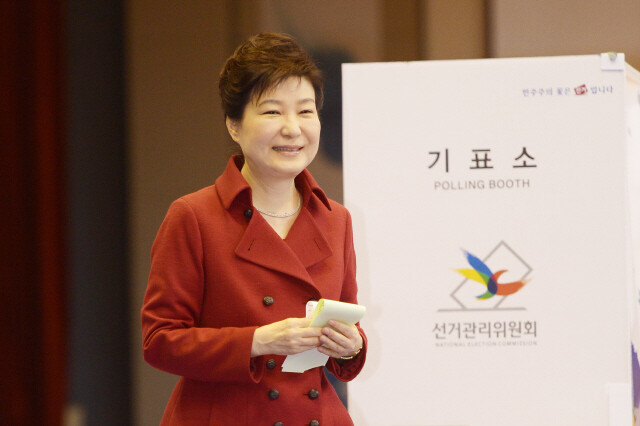hankyoreh
Links to other country sites 다른 나라 사이트 링크
[Editorial] Election results are a damning judgment on Park administration’s failures

If there’s one message the South Korean public sent in the Apr. 13 general elections, it was one of harsh judgment against the Park Geun-hye administration. Not only did the ruling Saenuri Party (NFP) fail to secure a majority, but it ended up with a disastrous 122 seats, yielding its spot as the number one party in the National Assembly to the Minjoo Party of Korea (TMPK), which won 123. This means the administration’s party is in the minority for the first time in 16 years. The Saenuri Party suffered an almost complete rout in Seoul and its surroundings, which may be seen as the best barometer of the popular feelings, and even lost many seats to the opposition and independents in traditional strongholds like Daegu, Busan, and North and South Gyeongsang Province.
With the vote count essentially finished as of 6 am on Apr. 14, the TMPK had victories in 110 of 253 districts. Saenuri succeeded in getting its nominees elected in just 105. The People’s Party had taken the lead in 25 districts, while the Justice Party won in two. The party vote, which determines proportional representation seats, showed 17 for Saenuri, 13 for the TMPK, 13 for the People’s Party, and four for the Justice Party.
The Saenuri’s defeat is all the more shattering for coming in a situation of opposition splintering that should clearly have worked in its favor. Before the election, many had predicted it would play the spoiler from all the opposition candidates in the race; at one point, the Saenuri was looking at the number of seats necessary to amend the Constitution on its own. Once the votes were actually cast, it was a very different story: a gigantic flop for the ruling party, not just in terms of total seats but also in quantitative terms.
The results are also a stern judgment from the voters against President Park herself. To be sure, part of it may be a matter of existing supporters turning their backs over their disappointment with the frictions that erupted in the Saenuri’s nomination process. But if we consider that those appalling nominations were Park’s own doing, it becomes all the more clear that the party’s rout was an expression of disgust and disappointment with the President herself. During the election, Park traveled to closely contested regions - on the pretext of visiting local Centers for Creative Economy & Innovation - and campaigned openly on behalf of her party’s candidates. She also made loud calls in Cabinet meetings for “passing judgment” on the opposition up until election eve. Instead, she was the one on the receiving end of the voters’ judgment. The same Park whose past triumphs earned her the nickname “election queen” bore the brunt of the public’s anger.

The message that voters sent Park is clear: she cannot keep running the country the way she has been. Critics have been blasting her arrogance and uncommunicative leadership constantly since she took office, but all of it has fallen on deaf ears. In the end, it was the voters who sent a clear message at the polls to a President unwilling to listen to words.
With Park suddenly losing her grip on governance after these results, she is certain to face rough going for the remainder of her term. At this point, there is only one direction she can go: humbly accepting the public’s message and completely transforming the way she runs things. She needs to stop trying to turn back the hands of time with her regressive patterns in democracy, human rights, the economy, foreign affairs, national security, and inter-Korean relations, and start steering the ship of state in the right direction. That’s the only way she can make it through the rest of her term unscathed. She needs to realize that if she continues with her arrogance and obstinacy out of misjudgment and a misplaced sense of confidence, she will find herself sliding deeper into the quicksand.
The voters‘ message to the opposition was complex and very subtle. First, the TMPK lost badly to the People’s Party in the Honam region (their traditional stronghold in the southwest), but did unexpectedly well in most others, including greater Seoul. It seems more accurate to call the TMPK‘s victory a by-product of the public’s disaffection with the administration, as opposed to something it achieved by its own efforts. The voters‘ decision to give it so many votes amid the worst splintering in opposition history means they were just that eager to punish the administration. In that sense, the TMPK should be careful not to misread things. Instead, it should be looking closely at the meaning of the voter defection it saw in Honam.
Opposition parties checked by crossover voting, tooThe election results clearly indicate that voters in the capital area and elsewhere engaged in crossover voting, giving their district vote to the candidate from the Minjoo Party and their party vote to the People’s Party.
In this way, liberal-leaning voters made a strategic vote for the Minjoo Party candidate they thought was more electable while also making clear that they were not satisfied with that party.
As a result, the Minjoo Party actually trailed the People‘s Party in the proportional voting. The Minjoo Party will have some serious soul-searching to do on this point.
And while the People’s Party might be gloating about the great progress it made in creating a viable three-party system, the actual outcome of the election shows no such thing.
Outside of the Honam region in the southwest, the People‘s Party was barely able to elect anyone in other parts of the country aside from party leader Ahn Cheol-soo. Looking strictly at the district outcomes, the People’s Party looks much more like a regional party than a nationwide party.
It is also clear that the victory of the People‘s Party in the Jeolla region relied on the opposition of voters there to Moon Jae-in, and not because they were smitten with “new politics” that Ahn has espoused.
In this sense, the public sentiment revealed through the general elections is quite complex. One possible analysis is that voters showed balance, clearly casting judgment on the current administration without giving their absolute support to its political opposition.
The political establishment should take pains to read the public sentiment accurately. In particular, the opposition parties must not commit the blunder of interpreting this sentiment in a self-serving way.
Please direct questions or comments to [english@hani.co.kr]

Editorial・opinion
![[Column] Has Korea, too, crossed the Rubicon on China? [Column] Has Korea, too, crossed the Rubicon on China?](https://flexible.img.hani.co.kr/flexible/normal/500/300/imgdb/original/2024/0419/9317135153409185.jpg) [Column] Has Korea, too, crossed the Rubicon on China?
[Column] Has Korea, too, crossed the Rubicon on China?![[Correspondent’s column] In Japan’s alliance with US, echoes of its past alliances with UK [Correspondent’s column] In Japan’s alliance with US, echoes of its past alliances with UK](https://flexible.img.hani.co.kr/flexible/normal/500/300/imgdb/original/2024/0419/2317135166563519.jpg) [Correspondent’s column] In Japan’s alliance with US, echoes of its past alliances with UK
[Correspondent’s column] In Japan’s alliance with US, echoes of its past alliances with UK- [Editorial] Does Yoon think the Korean public is wrong?
- [Editorial] As it bolsters its alliance with US, Japan must be accountable for past
- [Guest essay] Amending the Constitution is Yoon’s key to leaving office in public’s good graces
- [Editorial] 10 years on, lessons of Sewol tragedy must never be forgotten
- [Column] A death blow to Korea’s prosecutor politics
- [Correspondent’s column] The US and the end of Japanese pacifism
- [Guest essay] How Korea turned its trainee doctors into monsters
- [Guest essay] As someone who helped forge Seoul-Moscow ties, their status today troubles me
Most viewed articles
- 1[Column] The clock is ticking for Korea’s first lady
- 2After 2 months of delayed, denied medical care, Koreans worry worst may be yet to come
- 3Hong Se-hwa, voice for tolerance whose memoir of exile touched a chord, dies at 76
- 4[Column] Has Korea, too, crossed the Rubicon on China?
- 5[Correspondent’s column] In Japan’s alliance with US, echoes of its past alliances with UK
- 6Samsung barricades office as unionized workers strike for better conditions
- 7All eyes on Xiaomi after it pulls off EV that Apple couldn’t
- 8[Editorial] As it bolsters its alliance with US, Japan must be accountable for past
- 9[News analysis] After elections, prosecutorial reform will likely make legislative agenda
- 10US overtakes China as Korea’s top export market, prompting trade sanction jitters